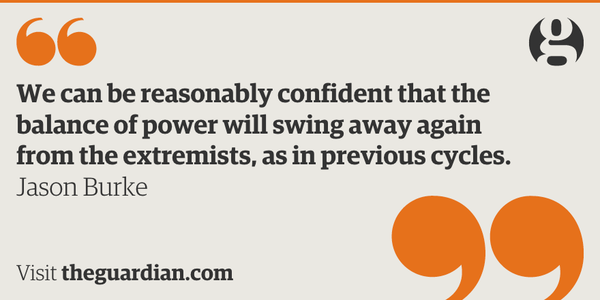
A great deal has been written about Islamic militancy in recent years. In 1995, there were around 1,000 books with the word terrorism in the title. By 2011, there were more than 10,000. That information comes courtesy of Jason Burke’s latest book on the subject, The New Threat from Islamic Militancy. He has no reason to fear the competition, since developments in what he calls the “diverse, dynamic, fragmentary and chaotic” nature of Islamic militancy have been extremely fast-paced, even since the publication of his own previous work, The 9/11 Wars, just four years ago.
Unapologetically focusing on the threat to the West, Burke identifies three major strands of militancy, two of which are relatively new: the emergence of the so-called Islamic State (Isis), with its focus on seizing and retaining territory; and the development of what he calls “the movement”, a worldwide subculture of Islamic extremism, rooted in anti-Western, anti-Semitic and homophobic sentiments, which has given rise to relatively low-tech terrorist attacks by self-motivated individuals or small groups, as in the murder of the British soldier Lee Rigby in 2013 or the attack on the offices of Charlie Hebdo in Paris earlier this year.
The reach and ambition of al Qaeda’s new rival, Isis, is also limited, at least for the time being. Despite the hundreds of young Muslims who have joined it and then returned home, Burke believes that the involvement of Isis in local violence has been deliberately exaggerated. He provides detailed profiles of many of these volunteers, characterising them as young, largely ignorant of their faith and Islamic history, and heavily influenced by propaganda videos. Another attraction of “the caliphate” for British Muslims, he believes, is the respite it provides from the challenge of casual xenophobia and from reconciling their new, heightened sense of Muslim identity with being British.
While stressing that the vast majority of British Muslims abhor violence, Burke is clear that intolerant and extremist views have been gaining ground in Britain, as elsewhere, with the emergence in the last decade or so of a youth subculture dubbed “jihadi cool”, similar in some ways to gang culture. Burke insists there is no “silver bullet” to counter this. But by identifying so clearly the roots and current manifestations of global Islamic militancy, he provides a comprehensive and authoritative picture of the threat it poses. In the struggle to maintain the diversity, tolerance and debate of Western society, he says, knowing your enemy represents an important victory.

